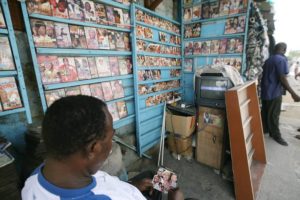 October 3, 2017//-The preference that Africans have for foreign media is not immediately obvious, but a closer look at what we consume through our pay-television channels across the continent shows that we have developed a taste for Western portrayals of reality – including of ourselves, says Caleb Ajinomoh.
October 3, 2017//-The preference that Africans have for foreign media is not immediately obvious, but a closer look at what we consume through our pay-television channels across the continent shows that we have developed a taste for Western portrayals of reality – including of ourselves, says Caleb Ajinomoh.
Recently, I have been paying attention to Africans on social media and it strikes me that this ‘woke’ generation is more asleep than our dead ancestors. Yes, the form in which they encountered colonisation made it difficult for them to resist, but this excuse is not useful today. Through our willful gobbling up of Western portrayals of reality, including the portrayal of Africa, we seem to approve of our own packaged colonisation.
Africans’ preference for foreign media is not immediately obvious, but a closer look at what shows are popular is proof of this. Many of these shows are accessible through undocumented back channels such as the multiple Torrent sites where you find some of the more popular shows – Game of Thrones, Suits, The Americans, Fargo, Grey’s Anatomy, How to Get Away with Murder and Orange is the new Black. When these shows cannot be found online, DStv channels such as Vuzu and M-Net City ensure their availability.
For our local fare, we have iROKOtv. Launched in 2011 by Jason Njoku, a British-Nigerian entrepreneur, iROKOtv provides paid, direct and unlimited access to Nollywood and Ghanaian movies. But since its arrival in January 2016, US-based video-on-demand (VOD) service Netflix has managed to garner the consumer base that it took Njoku’s enterprising channel seven years to gain. VOD services are increasing their presence on the continent in general, with big-leaguers such as the Naspers-owned Showmax claiming a significant share of the market. While these services have their limiting factors – Showmax, until May 2016, was limited to South Africa and Netflix has so far been inflexible with its subscription requirements – they remain enormously popular.
Who wades through 600+ channels to find the 13 that show local content?
A growing share of the market
According to a report by Africa.com, Africa’s pay-television revenue for 2015 stood at USD4,4 billion, a figure forecasted to climb to USD6 billion by 2021. The contributors to this stunning figure are some 17,8 million subscribers across the continent, according to data gleaned from a study conducted on 1 000 channels. Of the 18,7 million subscribers, 14 million are direct-to-home (DTH) subscribers. The bulk of content consumed by young people on the continent who can afford DTH subscription is heavily reliant on foreign production.
Emeka Offor, a 35-year-old accountant living in Enugu, Nigeria, is a DTH subscriber with DStv. “I have a Compact Plus plan, mostly for the sports channel. The kids have a separate plan for the TV in their room.”
The figure of 14 million is an interesting statistic considering the content of these channels. Emeka’s Compact Plus plan, for instance, has 12 local content channels, 11 of which are news channels. It lists 42 movie channels, only 13 of which are local content carriers – a litany of Africa Magic channels and East African TV. Who wades through 600+ channels to find the 13 that shows local content?
Not Raphael Yusuf, a 24-year-old undergraduate of the University of Lagos. “I can name 50 websites for downloading movies, and more for series. They’re accessible to anyone with Internet. What is Netflix?” Raphael asks, chuckling.
There is a populist sentiment that African content, no matter how well made, is for a certain demographic: an uncultured demographic. Some people consider it beneath their intelligence to suggest that they watch DStv’s Africa Magic channels.
“I don’t have iROKOtv,” says Raphael, dismissively. “But my sisters do. It’s for them.”
The challenges of African content
So why would a viewer prefer a Western drama to, say, EbonyLife TV, self-described as ‘Africa’s first Global Black Entertainment and Lifestyle Network’?
“They’re better written and acted,” says Ezra Obi, a 30-year-old court registrar from Ogun State, Nigeria. “African soaps rely too much on tropes.”
But viewers of standout African shows like Tinsel, Shuga, Jacob’s Cross and Rhythm Citydisagree. Michael Oloruntoba is an actor in his early 30s living in Abuja, who has starred in some Web series.
The concerns of the West are not always Africa’s concerns.
“I don’t agree that we’re not putting out better content. Look at Tinsel. They have produced over 1 000 episodes of pure quality,” he says. “They have great actors, great writers and great scenes. People shouldn’t make excuses. We know ourselves. We just like what is not our own.”
I checked. The M-Net-produced drama Tinsel had indeed, as at 2013, gulped down about N4 billion naira, costing USD900 per minute to shoot. You do not spend that kind of money to produce whack television.
The danger in rushing to condemn local programming in favour of Western stamps is that we become blind to these improvements and deaf to our own stories. The concerns of the West are not always Africa’s concerns. Young filmmakers, photographers, actors and writers on the continent are changing the quality of what Africa contributes to television. We are just not doing enough watching. Watching inspires useful criticism and useful criticism inspires better ideas. If they know we are watching, and watching with an eye to criticise, might they not do better?
Thisiafrica.me


